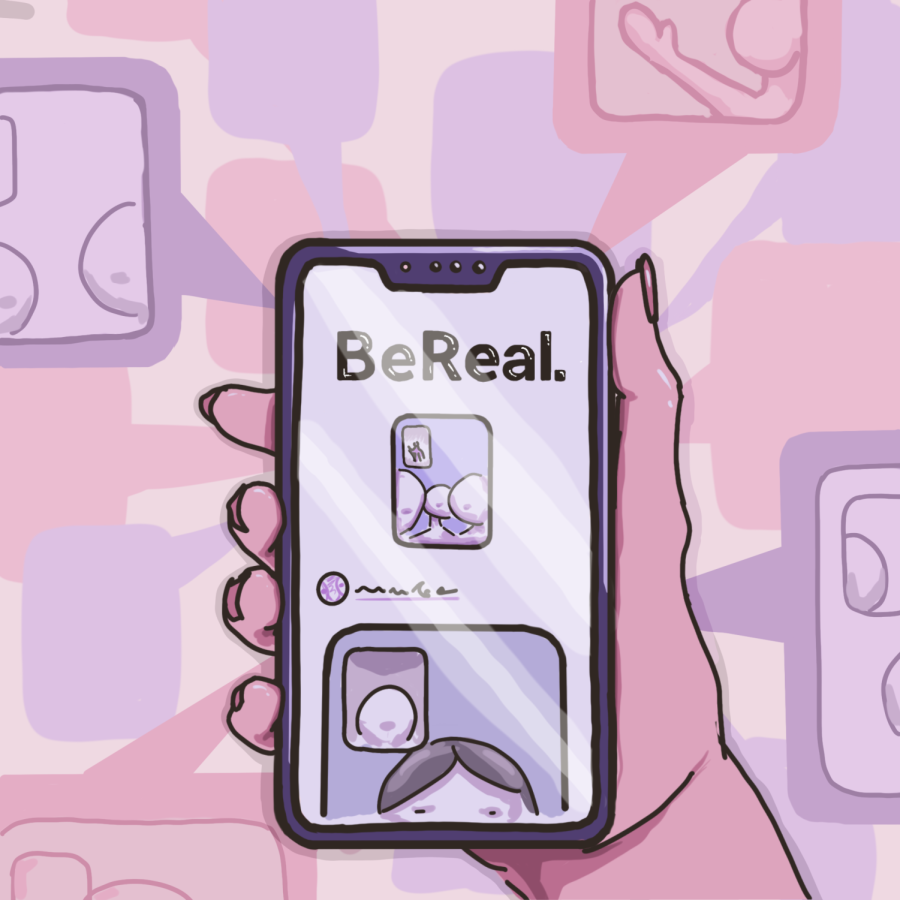What does it mean to Be Real?
As Gen-Z trends towards normalizing casual and authentic posting on social media, apps such as BeReal gain traction, fostering a more intimate view into people’s lives. Whether the app will continue its success or fade away remains unclear, but sustaining the app’s mission could be a step towards a healthier approach to social media.
“It’s Time to BeReal.”
The notification appears on millions of phones once a day. Whether walking around the hallways, waiting in the lunch line or sitting on their couch at home, students flock to their phones to post their daily photo. A scroll through one’s feed reveals mundane snippets of people’s lives — an unmade bed, a laptop keyboard, a window.
Created in 2019 by French entrepreneurs Alexis Barreyat and Kévin Perreau, the photo-sharing social media app BeReal faced relatively low popularity for the first two years of its existence. But this year, the app quickly rose to one of the most downloaded social media platforms, with monthly active users skyrocketing from 921,000 in July 2021 to 21.6 million in July 2022 due to its unique, unfiltered approach to social media.
BeReal allows users to connect with friends by notifying them to post a candid photo once a day, and promotes people sharing their most authentic selves rather than a curated version of their lives. By notifying all users at a randomized time, it provides two minutes for individuals to post exactly what they are doing at that moment, capturing both the person taking the picture and what they are seeing or doing. Users can post late, after the allotted two minute period, but cannot see other people’s photos until they post their own. The app strives for a more down-to-earth feel compared to other social media apps, with less pressure to look like your best self.
BeReal user Charlotte Ludlow (9) downloaded the app over the summer, curious as to what it entailed. She especially enjoys using RealMojis, a feature of BeReal that allows users to react to photos with real-life emojis.
“It’s a good social media platform to connect with your friends, but it’s not as addicting as many others,” Charlotte said. “I like being able to respond using my face – you can see more [and] interact with your friends.”
BeReal is just one part of the Gen-Z shift towards casual social media, with Instagram “photo dumps” and TikTok videos filmed on iPhones replacing the heavily-edited, oversaturated and staged media of the past. Social media platforms are notorious for causing mental health and self-image issues in growing teenagers, with individuals reporting a 70% increase in depressive symptoms due to an increase in social media usage, according to a study published on Cureus. Apps such as BeReal have become highly regarded by Gen-Z for focusing on the normalcy in people’s lives. Luke Mehta (11) finds this new form of social media meaningful because it reduces the pressure to post perfectly curated highlight reels.
“I like the idea of authentic posting much more because it doesn’t push the high standard that Instagram and current social media platforms have enforced on people for a while,” Luke said.
Yet, the app still allows for performative posting. Users often post their BeReal hours late, waiting until they are with friends or engaged in a fun activity to take the photo. Users also find ways to hide the number of retakes. The app meant to encourage authenticity is beginning to trend towards what Gen-Z condemned other social media apps for: presenting the most desirable moments of our lives.
User Navya Samuel (10) acknowledges that even with the pretense of authenticity, BeReal’s system is still somewhat flawed. She suggests that the app limit the time frame in which users can post their BeReal to prevent performative posting.
“Although I like BeReal, people are fake all the time, so it doesn’t really work in the way they wanted it to be,” Navya said. “But, it works in some ways because you get to see the coolest part of people’s days.”
As Gen-Z trends towards normalizing casual and authentic posting on social media, apps such as BeReal gain traction, fostering a more intimate view into people’s lives. Whether the app will continue its success or fade away remains unclear, but sustaining the app’s mission could be a step towards a healthier approach to social media.

Selina Xu (12) is a co-managing editor for Harker Aquila, and this is her fourth year on staff. This year, Selina hopes to hold engaging conversations...

Medha Yarlagadda (12) is a co-managing editor for Harker Aquila, and this is her fourth year on staff. This year, she hopes to work more closely with the...


















![“[Building nerf blasters] became this outlet of creativity for me that hasn't been matched by anything else. The process [of] making a build complete to your desire is such a painstakingly difficult process, but I've had to learn from [the skills needed from] soldering to proper painting. There's so many different options for everything, if you think about it, it exists. The best part is [that] if it doesn't exist, you can build it yourself," Ishaan Parate said.](https://harkeraquila.com/wp-content/uploads/2022/08/DSC_8149-900x604.jpg)




![“When I came into high school, I was ready to be a follower. But DECA was a game changer for me. It helped me overcome my fear of public speaking, and it's played such a major role in who I've become today. To be able to successfully lead a chapter of 150 students, an officer team and be one of the upperclassmen I once really admired is something I'm [really] proud of,” Anvitha Tummala ('21) said.](https://harkeraquila.com/wp-content/uploads/2021/07/Screen-Shot-2021-07-25-at-9.50.05-AM-900x594.png)







![“I think getting up in the morning and having a sense of purpose [is exciting]. I think without a certain amount of drive, life is kind of obsolete and mundane, and I think having that every single day is what makes each day unique and kind of makes life exciting,” Neymika Jain (12) said.](https://harkeraquila.com/wp-content/uploads/2017/06/Screen-Shot-2017-06-03-at-4.54.16-PM.png)








![“My slogan is ‘slow feet, don’t eat, and I’m hungry.’ You need to run fast to get where you are–you aren't going to get those championships if you aren't fast,” Angel Cervantes (12) said. “I want to do well in school on my tests and in track and win championships for my team. I live by that, [and] I can do that anywhere: in the classroom or on the field.”](https://harkeraquila.com/wp-content/uploads/2018/06/DSC5146-900x601.jpg)
![“[Volleyball has] taught me how to fall correctly, and another thing it taught is that you don’t have to be the best at something to be good at it. If you just hit the ball in a smart way, then it still scores points and you’re good at it. You could be a background player and still make a much bigger impact on the team than you would think,” Anya Gert (’20) said.](https://harkeraquila.com/wp-content/uploads/2020/06/AnnaGert_JinTuan_HoHPhotoEdited-600x900.jpeg)

![“I'm not nearly there yet, but [my confidence has] definitely been getting better since I was pretty shy and timid coming into Harker my freshman year. I know that there's a lot of people that are really confident in what they do, and I really admire them. Everyone's so driven and that has really pushed me to kind of try to find my own place in high school and be more confident,” Alyssa Huang (’20) said.](https://harkeraquila.com/wp-content/uploads/2020/06/AlyssaHuang_EmilyChen_HoHPhoto-900x749.jpeg)




